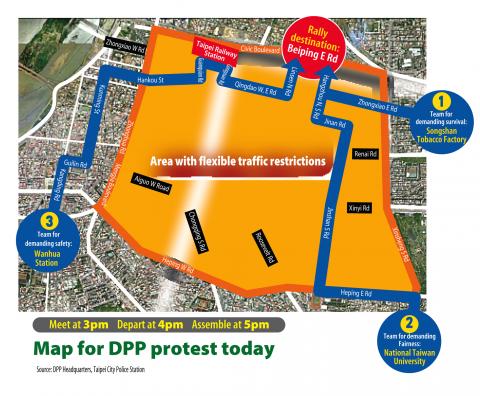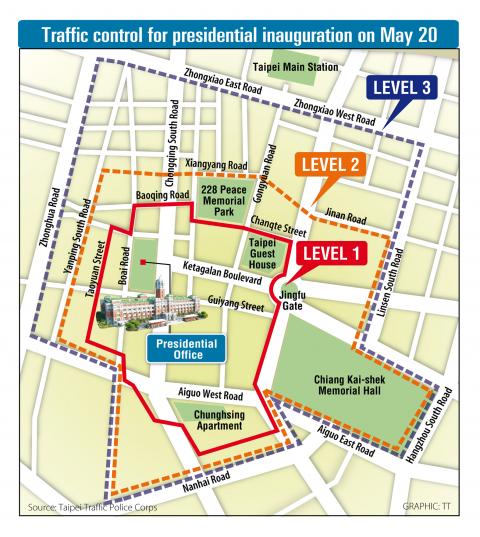Members of the People First Party are set to join a mass protest in Taipei spearheaded by the Democratic Progressive Party (DPP) today.
The DPP-sponsored protest which is galvanizing support under the banner “It’s hard to survive; the President needs to explain why,” will protest against President Ma Ying-jeou’s (馬英九) poor governance and controversial government plans including a proposal to ease US beef imports containing the growth additive ractopamine, increases in fuel and electricity costs and the “one country, two areas (一國兩區)” strategy touted by Chinese Nationalist Party (KMT) officials.
The protest will proceed from three assembly points: DPP acting chairperson Chen Chu (陳菊) will lead one group from Songshan Tobacco Factory (松山菸廠), another will be led by former DPP chairperson Tsai Ing-wen (蔡英文) and will start at National Taiwan University and a third is to be led by former premier Su Tseng-chang (蘇貞昌) starting at Wanhua Rail Station.

People are to meet at each of the three locations at 3pm and will begin their processions at 4pm. They plan to converge on Beiping E Road at 5pm, where a rally will be held.
Chen said yesterday that because the public is suffering, she has decided not to attend Ma’s second-term inauguration ceremony on Sunday.
The Taiwan Solidarity Union (TSU) yesterday said the party would take part in the DPP-sponsored demonstration and called for protesters to stage sit-ins through the night following the end of the DPP rally and then to attend the TSU-sponsored rally tomorrow.

The TSU’s rally is to start at Huashan Park (華山公園) at 8am and march to an area near the Presidential Office and end at Chongqing S Road by noon.
The PFP called a press conference yesterday saying the party encouraged its cadres and members to join pan-green initiated protests against Ma.
“We will not join the protest in the name of the party because we do not support the recall of Ma and the release of former president Chen Shui-bian (陳水扁), but we encourage party members to take part in an individual capacity,” PFP caucus whip Thomas Lee (李桐豪) said.
PFP Deputy Secretary-General Liu Wen-hsiung (劉文雄) said the party supports the demonstrations, but said the support is only limited to the issues related to gasoline and electricity price increases, the government-proposed capital gains tax on securities transactions and the plan to partially lift the ban on imports of US beef containing ractopamine.
“Don’t be surprised if you see PFP Chairman James Soong (宋楚瑜) in the crowd,” Liu said.
Lee urged Ma to either “step down voluntarily” or “retreat to the back line and delegate power to Premier Sean Chen” saying that people do not hold much hope for Ma’s second term.
Ma should seriously consider the two options if he fails to revive his sinking approval ratings within two months — the lowest ever recorded for any Taiwanese president in political history, he added.
Separately, KMT Legislator Apollo Chen (陳學聖) suggested that Ma hold a press conference and apologize to the public.
“Offering an apology would be just the beginning. Only when the president is willing to stand with the people and to make adjustments to his policy and key government personnel, is he likely to see his approval ratings climb,” he said.
KMT Legislator Yang Li-huan (楊麗環) was also of the opinion that Ma has to apologize first.
“But what would be more important is what he will do next. He has to explain the rationale of his policies to the people,” she said.

The CIA has a message for Chinese government officials worried about their place in Chinese President Xi Jinping’s (習近平) government: Come work with us. The agency released two Mandarin-language videos on social media on Thursday inviting disgruntled officials to contact the CIA. The recruitment videos posted on YouTube and X racked up more than 5 million views combined in their first day. The outreach comes as CIA Director John Ratcliffe has vowed to boost the agency’s use of intelligence from human sources and its focus on China, which has recently targeted US officials with its own espionage operations. The videos are “aimed at

STEADFAST FRIEND: The bills encourage increased Taiwan-US engagement and address China’s distortion of UN Resolution 2758 to isolate Taiwan internationally The Presidential Office yesterday thanked the US House of Representatives for unanimously passing two Taiwan-related bills highlighting its solid support for Taiwan’s democracy and global participation, and for deepening bilateral relations. One of the bills, the Taiwan Assurance Implementation Act, requires the US Department of State to periodically review its guidelines for engagement with Taiwan, and report to the US Congress on the guidelines and plans to lift self-imposed limitations on US-Taiwan engagement. The other bill is the Taiwan International Solidarity Act, which clarifies that UN Resolution 2758 does not address the issue of the representation of Taiwan or its people in

US Indo-Pacific Commander Admiral Samuel Paparo on Friday expressed concern over the rate at which China is diversifying its military exercises, the Financial Times (FT) reported on Saturday. “The rates of change on the depth and breadth of their exercises is the one non-linear effect that I’ve seen in the last year that wakes me up at night or keeps me up at night,” Paparo was quoted by FT as saying while attending the annual Sedona Forum at the McCain Institute in Arizona. Paparo also expressed concern over the speed with which China was expanding its military. While the US

SHIFT: Taiwan’s better-than-expected first-quarter GDP and signs of weakness in the US have driven global capital back to emerging markets, the central bank head said The central bank yesterday blamed market speculation for the steep rise in the local currency, and urged exporters and financial institutions to stay calm and stop panic sell-offs to avoid hurting their own profitability. The nation’s top monetary policymaker said that it would step in, if necessary, to maintain order and stability in the foreign exchange market. The remarks came as the NT dollar yesterday closed up NT$0.919 to NT$30.145 against the US dollar in Taipei trading, after rising as high as NT$29.59 in intraday trading. The local currency has surged 5.85 percent against the greenback over the past two sessions, central